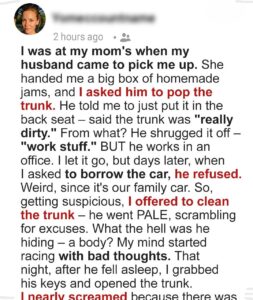My Husband Told Me Not to Open the Trunk for Days — What I Discovered Late One Night Changed Everything

I should’ve picked up on the shift when Lily swept her hair behind her ears.
It was the first time she wasn’t covering the scar.
That scar had haunted her since the accident—three years ago, when she was just eleven. One moment by the campfire, a faulty propane tank, and then flames. The doctors called it a miracle she survived. But they never heard her muffled sobs behind the bathroom door or saw the glass she smashed in frustration.
I did.
So when she quietly said, “I’m done hiding,” I should’ve known something was going to happen.
My fiancée Melissa had invited us to her family’s Fourth of July gathering. It felt symbolic—a step toward healing, a fresh start.
But peace doesn’t usually come with potato salad, forced smiles, and chilled wine.
At first, it all went surprisingly smoothly. Lily chatted politely with people she’d never met, even laughed a little at someone’s story. I let myself relax for the first time in ages—until Melissa’s mom leaned forward from across the table.
“Darling,” she said sweetly, like she was about to offer advice on skincare, “what happened there? The scar—it must’ve been traumatic?”
Lily froze mid-bite.
I stopped breathing.
But she wasn’t finished.
“People probably stare, right? I mean, it’s natural. But you’re not thinking of keeping your hair back like that at the wedding, are you? It might take attention away from the bride.”
Lily’s hand stopped, fork hovering.
Melissa? She stayed quiet. Didn’t even look up.
That was the part that hurt the most. Not the cruel comment. Not the fake smile. But the silence. Melissa’s silence. The one that echoed louder than any insult.
I leaned in close to Lily and whispered, “Want to go?”
She nodded. Then added, “But first, I need to say something.”
And in that instant, something shifted in the air.
She stood.
The entire table went still.
“If we’re cropping out the things people don’t want to see,” she said, calm but cutting, “maybe you should think about trimming those 20 extra pounds. I’m sure they’ll clash with the wedding photos.”
Utensils dropped. Someone choked on their drink. Melissa’s mother turned a furious shade of crimson.
I didn’t look. I was too focused on Lily—standing tall, voice unwavering, like she’d been waiting years to speak up.
Melissa stormed after us onto the porch.
“You owe my mom an apology. She was just making conversation.”
No.
A joke’s only a joke if someone’s laughing.
That was the moment I saw her for who she really was—not someone who had my back, but someone who failed the one test that mattered: defend the child.
She called that night.
Said I had embarrassed her family. Said Lily was “too sensitive” and probably needed more therapy if she couldn’t handle a harmless comment.
I didn’t fight. Didn’t raise my voice.
“If you can’t show up for my daughter when it matters,” I said, “we’re done.”
And that was that.
No regrets. No what-ifs.
Later that night, I stood in the hallway, watching Lily sleep peacefully. The faint light revealed the scar on her face.
And I realized:
She was never broken.
She never needed to be hidden.
The world just needed to stop looking at her like she did.